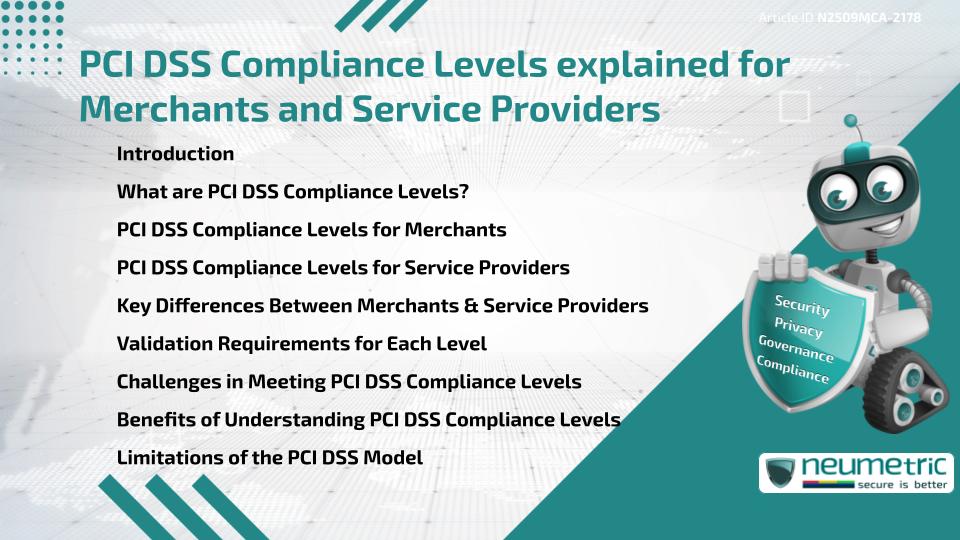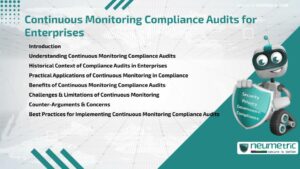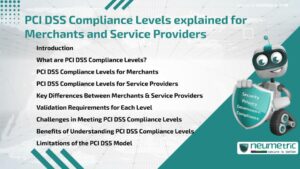Table of Contents
ToggleIntroduction
Payment Card Industry Data Security Standard [PCI DSS] sets rules for protecting Cardholder Information & preventing fraud. Businesses that accept, process or transmit card payments must meet specific compliance levels, which vary based on the volume of transactions & business type. This article on PCI DSS Compliance levels explained will outline the four levels of compliance for merchants, the two levels for service providers, the validation requirements, key differences, benefits & limitations. Whether you are a merchant handling small volumes or a service provider processing millions of transactions, understanding these levels helps reduce Risk & maintain trust.
What are PCI DSS Compliance Levels?
PCI DSS Compliance levels are classifications used to group merchants & service providers based on their annual card transaction volume. Each level has different validation requirements, such as completing a Self-Assessment Questionnaire [SAQ], undergoing a formal Audit or performing network scans. The purpose is to match compliance obligations with the scale of Risk. A small retailer processing a few hundred transactions will not be treated the same as a global bank processing millions.
PCI DSS Compliance Levels for Merchants
Merchants are divided into four levels:
- Level 1: More than six (6) million card transactions annually across all channels. These require a yearly onsite Assessment by a Qualified Security Assessor [QSA].
- Level 2: Between one (1) million & six (6) million transactions annually. Usually requires an SAQ & sometimes additional validation depending on the card brand.
- Level 3: Between twenty thousand (20,000) and one (1) million e-commerce transactions annually. SAQ is the main requirement.
- Level 4: Fewer than twenty thousand (20,000) e-commerce transactions or fewer than one (1) million overall. These businesses usually complete an SAQ & may need quarterly network scans.
PCI DSS Compliance Levels for Service Providers
Service providers have only two compliance levels:
- Level 1: Those handling more than three hundred thousand (300,000) transactions annually or providing critical services to merchants. Requires an annual onsite QSA Assessment.
- Level 2: Those handling fewer than three hundred thousand (300,000) transactions annually. Typically allowed to complete an SAQ with an attestation.
Key Differences Between Merchants & Service Providers
The main distinction lies in who owns the transaction relationship. Merchants accept payments directly from customers, while service providers enable or process those transactions on behalf of merchants. This difference means service providers are held to stricter oversight in many cases, since their systems often impact multiple merchants at once.
Validation Requirements for Each Level
Validation activities range from self-assessments to detailed external audits:
- Self-Assessment Questionnaire [SAQ]: A structured form covering Security Controls. Used mainly for Levels 2-4 merchants & Level 2 service providers.
- Onsite Audit by QSA: Required for Level 1 merchants & Level 1 service providers.
- Quarterly Scans: Conducted by an Approved Scanning Vendor [ASV] to identify Vulnerabilities.
The level of scrutiny increases with transaction volume & the potential impact of a breach.
Challenges in Meeting PCI DSS Compliance Levels
Achieving compliance can be complex. Merchants & service providers often face:
- Costs of audits & security tools.
- Managing Third Party Risks.
- Keeping up with changing PCI DSS versions.
- Aligning compliance with Business Operations without slowing transactions.
Smaller businesses may struggle with technical requirements, while larger ones must coordinate compliance across global operations.
Benefits of Understanding PCI DSS Compliance Levels
Clear knowledge of compliance levels offers several advantages:
- Better protection of Customer payment data.
- Reduced Likelihood of fines or penalties.
- Stronger reputation & Customer Trust.
- Streamlined security operations.
Compliance also helps businesses meet overlapping regulatory expectations, creating efficiency.
Limitations of the PCI DSS Model
Although PCI DSS is widely accepted, it has some limitations:
- It focuses on baseline controls, not advanced Threats.
- Compliance does not guarantee complete security.
- Implementation can be rigid for businesses with unique models.
These limitations mean that businesses should treat PCI DSS as a foundation rather than the entirety of their security strategy.
Takeaways
PCI DSS Compliance levels explained in detail show that merchants & service providers must align their security obligations with transaction volume & Risk exposure. The right understanding not only prevents costly breaches but also builds long-term trust with customers.
FAQ
What is the main purpose of PCI DSS Compliance levels?
They categorise businesses by transaction volume to determine appropriate security validation requirements.
Do small merchants need a full Audit?
No, most small merchants only need to complete a Self-Assessment Questionnaire & possibly quarterly scans.
Are service providers subject to stricter requirements than merchants?
Yes, service providers often face stricter requirements since they process or store data for multiple merchants.
How often must compliance be validated?
Validation is required annually, with quarterly scans if applicable.
Can a merchant move between compliance levels?
Yes, if transaction volumes increase or decrease, a merchant may move to a different compliance level.
Does PCI DSS guarantee no data breaches?
No, compliance reduces Risk but does not eliminate the possibility of a breach.
Who enforces PCI DSS Compliance?
Compliance is enforced by the card brands & acquiring Banks through contractual obligations.
Need help for Security, Privacy, Governance & VAPT?
Neumetric provides organisations the necessary help to achieve their Cybersecurity, Compliance, Governance, Privacy, Certifications & Pentesting needs.
Organisations & Businesses, specifically those which provide SaaS & AI Solutions in the Fintech, BFSI & other regulated sectors, usually need a Cybersecurity Partner for meeting & maintaining the ongoing Security & Privacy needs & requirements of their Enterprise Clients & Privacy conscious Customers.
SOC 2, ISO 27001, ISO 42001, NIST, HIPAA, HECVAT, EU GDPR are some of the Frameworks that are served by Fusion – a SaaS, multimodular, multitenant, centralised, automated, Cybersecurity & Compliance Management system.
Neumetric also provides Expert Services for technical security which covers VAPT for Web Applications, APIs, iOS & Android Mobile Apps, Security Testing for AWS & other Cloud Environments & Cloud Infrastructure & other similar scopes.
Reach out to us by Email or filling out the Contact Form…





